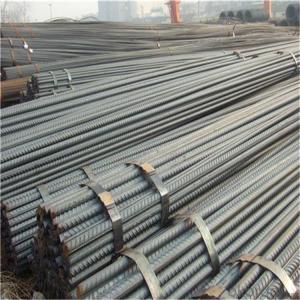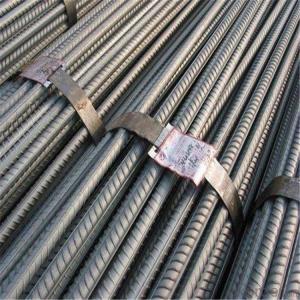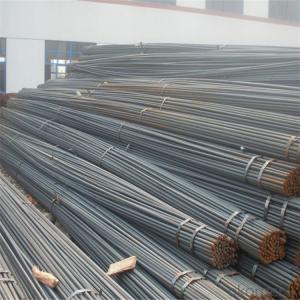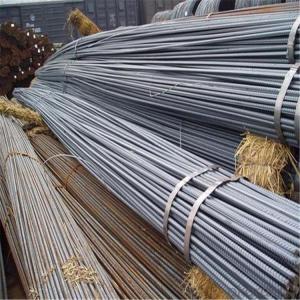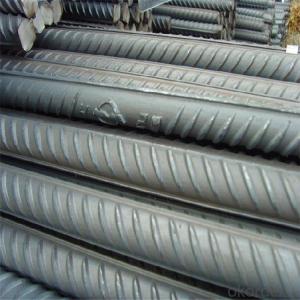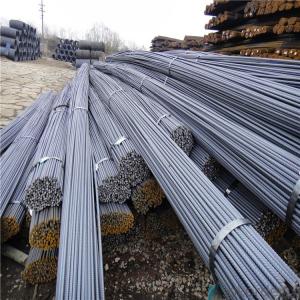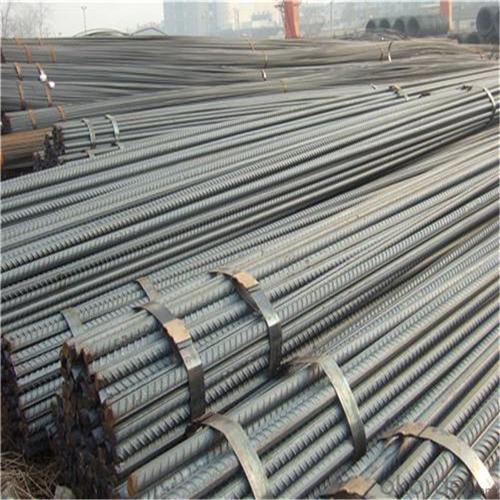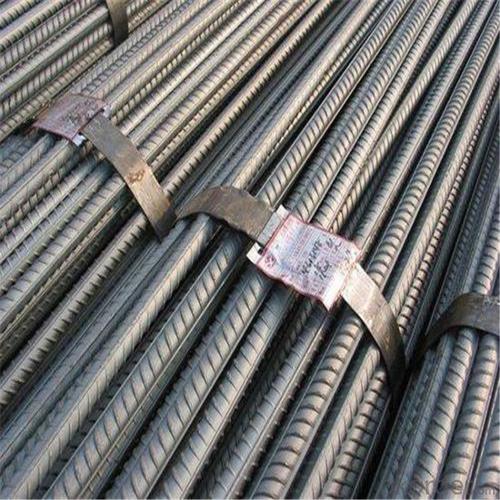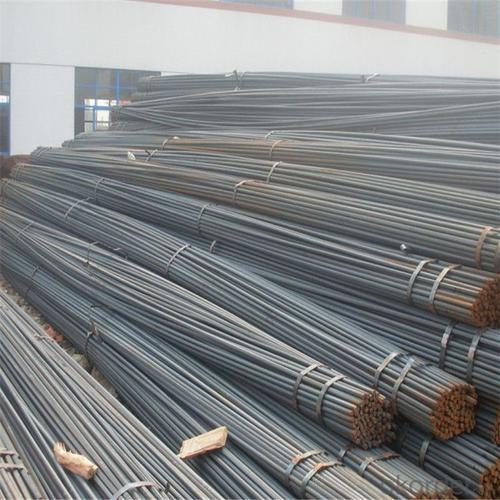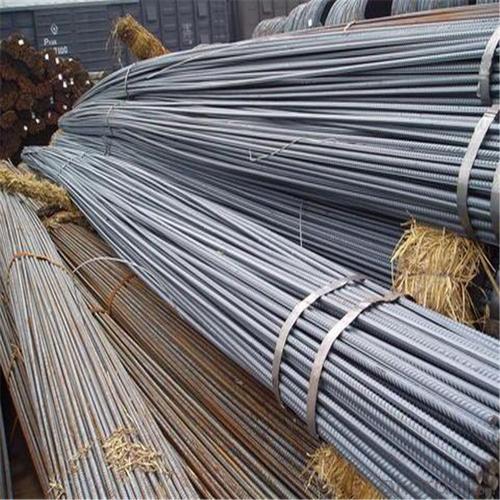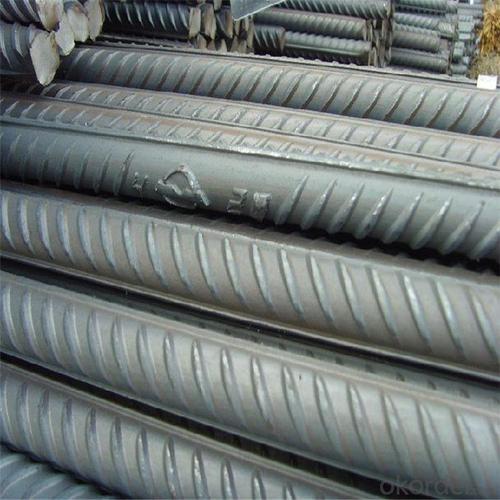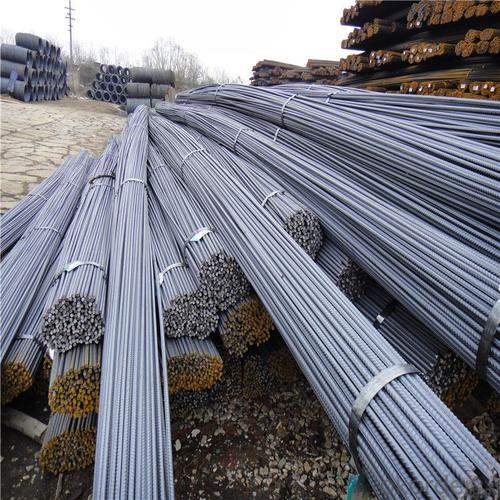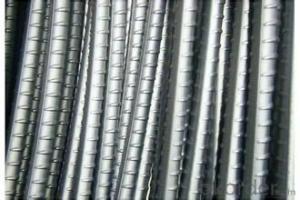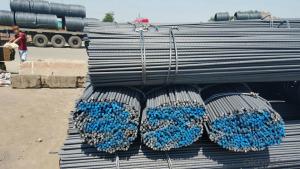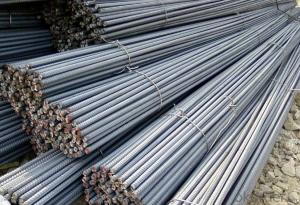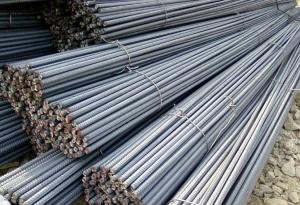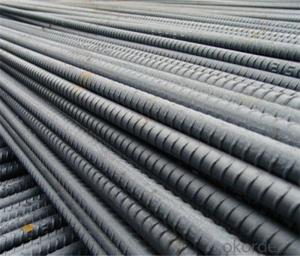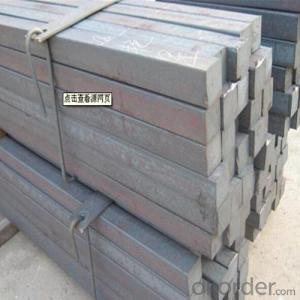Bending Deformed Bar For Container
- Loading Port:
- Tianjin
- Payment Terms:
- TT OR LC
- Min Order Qty:
- 160 m.t.
- Supply Capability:
- 50000 m.t./month
OKorder Service Pledge
OKorder Financial Service
You Might Also Like
Specification
Bending Deformed Bar For Container
Description of Bending Deformed Bar For Container
1, Diameter: 5.5mm-10mm Bending Deformed Bar For Container
10m- 40mm Bending Deformed Bar For Container
2, Length: 6m, 9m, 12m or customized
3, Standard: GB, ASTM, AISI, SAE, DIN, JIS, EN
OEM technology - send detailed technical parameters for accurate quotation.
2, Produce Process: smelt iron - EAF smelt billet - ESR smelt billet -
hot rolled or forged to get the steel round bar and plate
3, Heat Treatment: annealing, normalizing, tempering, quenching
4, Surface Treatment: Black
5, Quality Assurance: We accept third party inspection for all orders.
You can ask testing organizations such as SGS, BV, etc. to test our products before shipping.
Chemical Composition of Bending Deformed Bar For Container
Grade | Technical data of the original chemical composition(%) | |||||
Reinforcing steel bar HRB335 | C | Mn | Si | S | P | B |
≤0.25 | ≤1.60 | ≤0.80 | ≤0.045 | ≤0.045 | >0.0008 | |
Physics Capability | ||||||
Yield Strength(N/cm2) | Tensile Strength(N/cm2) | Elongation(%) | ||||
≥ 335 | ≥490 | ≥16 | ||||
Reinforcing steel bar HRB400 | C | Mn | Si | S | P | B |
≤0.25 | ≤0.16 | ≤0.80 | ≤0.045 | ≤0.045 | 0.04-0.12 | |
Physics Capability | ||||||
Yield Strength(N/cm2) | Tensile Strength(N/cm2) | Elongation(%) | ||||
≥ 400 | ≥ 570 | ≥ 14 | ||||
Products Show of Bending Deformed Bar For Container
Company Information
CNBM International Corporation is the most important trading platform of CNBM group.
Whith its advantages, CNBM International are mainly concentrate on Cement, Glass, Iron and Steel, Ceramics industries and devotes herself for supplying high qulity series of refractories as well as technical consultancies and logistics solutions.


F A Q
1, Your advantages?
professional products inquiry, products knowledge train (for agents), smooth goods delivery, excellent customer solution proposale
2, Test & Certificate?
SGS test is available, customer inspection before shipping is welcome, third party inspection is no problem
3, Factory or Trading Company?
CNBM is a trading company but we have so many protocol factories and CNBM works as a trading department of these factories. Also CNBM is the holding company of many factories.
4, Payment Terms?
30% TT as deposit and 70% before delivery.
Irrevocable L/C at sight.
5, Trading Terms?
EXW, FOB, CIF, FFR, CNF
6, After-sale Service?
CNBM provides the services and support you need for every step of our cooperation. We're the business partner you can trust.
For any problem, please kindly contact us at any your convenient time.
We'll reply you in our first priority within 24 hours.
- Q: What are the properties of leaded steel?
- Leaded steel is a type of steel that contains a small amount of lead, typically between 0.15% to 0.35% by weight. The addition of lead improves the machinability of the steel, making it easier to cut and shape. Leaded steel also has excellent lubricity, reducing friction and wear during machining operations. However, it is important to note that leaded steel may have reduced mechanical properties such as strength and toughness compared to non-leaded steels. Additionally, the presence of lead can have environmental and health implications, so proper handling and disposal measures need to be taken.
- Q: How is special steel used in the production of engine components?
- Special steel is used in the production of engine components due to its high strength, durability, and resistance to heat and corrosion. It is commonly used for manufacturing pistons, crankshafts, valves, and connecting rods, ensuring the engine's optimal performance and longevity. Additionally, special steel's ability to withstand extreme temperatures and stress makes it an ideal choice for critical engine parts, enabling them to function efficiently under demanding conditions.
- Q: How does free-cutting steel improve machinability?
- Free-cutting steel improves machinability by containing additional elements, such as sulfur, lead, or phosphorus, which help to break the chips and aid in chip removal during the machining process. These elements act as lubricants, reducing friction and heat generation, which results in improved surface finish and reduced tool wear.
- Q: What are the common challenges in heat treating special steel?
- Heat treating special steel poses a range of difficulties. One of the main challenges is to attain the desired hardness and strength while maintaining the desired microstructure. Special steels often necessitate specific heat treatment processes, such as quenching and tempering, to achieve the desired mechanical properties. However, the high alloy content in these steels can make it challenging to achieve uniform heat distribution and control the cooling rate during quenching, resulting in inconsistent hardness and potential distortion. Another obstacle in heat treating special steel is managing residual stresses. During the heating and cooling process, differential thermal expansion and contraction can cause stress to accumulate within the steel, potentially leading to cracking or distortion. To minimize these stresses, it is crucial to employ proper heat treatment techniques, such as preheating and controlled cooling rates. Special steels also require stringent cleanliness standards, as impurities or non-metallic inclusions can adversely affect their mechanical properties. Ensuring the cleanliness of the steel prior to heat treatment can be difficult and may entail additional steps, such as degreasing, pickling, or using protective atmospheres during heat treatment. Furthermore, some special steels are highly susceptible to overheating, which can result in grain growth and the loss of desired properties. To prevent overheating and ensure consistent outcomes, precise temperature control and monitoring are essential. Finally, heat treatment of special steels must take into account specific time-temperature transformation (TTT) and continuous cooling transformation (CCT) characteristics. Understanding and adhering to the appropriate heating and cooling cycles are crucial for achieving the desired microstructure and properties. In conclusion, the challenges in heat treating special steel include achieving the desired hardness and microstructure, managing residual stresses, ensuring cleanliness, preventing overheating, and adhering to specific time-temperature transformation characteristics. Overcoming these challenges necessitates expertise, precise control, and strict adherence to heat treatment protocols.
- Q: What are the different forming techniques used for special steel?
- Some of the different forming techniques used for special steel include forging, casting, rolling, and extrusion.
- Q: How does special steel contribute to the packaging aftermarket industry?
- The packaging aftermarket industry greatly benefits from the use of special steel, which provides various advantages that enhance the efficiency and quality of packaging processes. Firstly, special steel is renowned for its exceptional strength and durability, making it ideal for the manufacturing of packaging machinery and equipment. This durability ensures that the machinery can withstand the demanding requirements of the industry, resulting in improved reliability and less downtime. Additionally, special steel boasts excellent resistance to corrosion, making it highly suitable for packaging applications that involve exposure to moisture, chemicals, or extreme temperatures. This corrosion resistance extends the lifespan of packaging equipment and prevents degradation, ultimately reducing maintenance costs and enhancing the overall efficiency of the packaging aftermarket industry. Moreover, special steel can be customized to meet specific needs, allowing for the production of tailored packaging solutions. This flexibility and versatility enable manufacturers to create innovative designs that enhance product protection, optimize space utilization, and improve transportation logistics. For example, special steel can be used to manufacture lightweight yet strong packaging materials, reducing shipping costs and minimizing the environmental impact associated with packaging waste. Furthermore, special steel possesses excellent machinability and weldability, making it easy to fabricate intricate packaging components with high precision. This capability enables manufacturers to produce packaging solutions that perfectly fit specific product dimensions, ensuring optimal protection during transit. In conclusion, special steel plays a vital role in the packaging aftermarket industry by offering strength, durability, corrosion resistance, customization options, and excellent machinability. These qualities contribute to the overall efficiency, reliability, and quality of packaging processes, benefiting both manufacturers and consumers.
- Q: How does the addition of nickel enhance the properties of special steel?
- The properties of special steel are enhanced in several ways through the addition of nickel. To begin with, the strength of steel is increased by nickel, resulting in enhanced durability and resistance to deformation. This is particularly crucial in situations where the steel will be exposed to high temperatures or heavy loads. Additionally, the corrosion resistance of steel is improved by nickel. When exposed to moisture or harsh chemicals, nickel forms a protective oxide layer on the steel's surface, preventing rusting or corrosion. This is particularly valuable in industries like marine, aerospace, and chemical processing, where steel is frequently subjected to corrosive environments. Furthermore, the toughness of steel is improved by nickel, allowing it to withstand impact or sudden temperature changes without fracturing or cracking. This makes it suitable for applications that require high resistance to shock or vibration, such as construction, automotive, or machinery manufacturing. Moreover, nickel enhances the heat resistance of steel. By increasing the steel's ability to retain strength and shape at high temperatures, nickel makes it suitable for use in high-temperature environments, such as power generation, oil and gas, or furnace systems. In conclusion, the addition of nickel to special steel enhances its strength, corrosion resistance, toughness, and heat resistance. These improved properties make nickel-enhanced steel highly desirable in a wide range of industries and applications, where durability, reliability, and performance under challenging conditions are of utmost importance.
- Q: What are the main applications of special steel in the chemical industry?
- Special steel is widely used in the chemical industry due to its excellent properties such as corrosion resistance, high temperature resistance, and strength. It is primarily used in the construction of chemical processing equipment, including reactors, pipes, valves, and storage tanks. Special steel ensures the safe and efficient handling of corrosive chemicals, as well as the prevention of leaks and contamination. Additionally, it is utilized in the production of catalysts, which play a crucial role in various chemical reactions. Overall, special steel enables the chemical industry to maintain high product quality, operational efficiency, and safety standards.
- Q: Can special steel be used in the solar panel manufacturing industry?
- Yes, special steel can be used in the solar panel manufacturing industry. Special steel, such as stainless steel or high-strength steel, is often utilized in the construction of solar panel frames, mounting structures, and other supporting components due to its durability, corrosion resistance, and mechanical properties.
- Q: Can special steel be used in the manufacturing of precision instruments?
- Yes, special steel can be used in the manufacturing of precision instruments. Special steel refers to a category of steel that has been specifically designed and processed to possess certain properties, such as high strength, hardness, corrosion resistance, and thermal stability. These properties make special steel ideal for applications where precision and accuracy are crucial, such as in the manufacturing of precision instruments. Precision instruments, such as surgical tools, measuring devices, optical instruments, and scientific equipment, require materials that can maintain dimensional stability and withstand extreme conditions. Special steels, such as stainless steel, tool steel, and high-speed steel, offer excellent mechanical properties, including high tensile strength, wear resistance, and dimensional stability. This makes them well-suited for precision instrument manufacturing. Furthermore, special steel can be engineered to have specific characteristics, such as low magnetic permeability or excellent resistance to temperature changes. These properties are particularly important in precision instruments where magnetic interference or temperature variations can affect their performance. In conclusion, special steel can indeed be used in the manufacturing of precision instruments due to its exceptional mechanical properties, dimensional stability, and ability to withstand extreme conditions. Its versatility allows for the production of high-quality precision instruments that meet the stringent requirements of various industries, including medical, scientific, and engineering fields.
Send your message to us
Bending Deformed Bar For Container
- Loading Port:
- Tianjin
- Payment Terms:
- TT OR LC
- Min Order Qty:
- 160 m.t.
- Supply Capability:
- 50000 m.t./month
OKorder Service Pledge
OKorder Financial Service
Similar products
Hot products
Hot Searches
Related keywords
